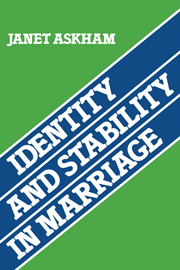Book contents
- Frontmatter
- Contents
- Preface
- 1 Prologue
- 2 Ways of looking at marriage: an introduction to the study
- 3 Knowing and talking to each other
- 4 Separate and joint activity
- 5 Constraints on behaviour within marriage
- 6 Changes in self and in activities
- 7 Relationships outside marriage
- 8 Conclusion
- Appendix 1 Sample selection
- Appendix 2 Interview guide
- Appendix 3 Profiles of the couples
- Glossary
- Bibliography
- Index
5 - Constraints on behaviour within marriage
Published online by Cambridge University Press: 07 October 2011
- Frontmatter
- Contents
- Preface
- 1 Prologue
- 2 Ways of looking at marriage: an introduction to the study
- 3 Knowing and talking to each other
- 4 Separate and joint activity
- 5 Constraints on behaviour within marriage
- 6 Changes in self and in activities
- 7 Relationships outside marriage
- 8 Conclusion
- Appendix 1 Sample selection
- Appendix 2 Interview guide
- Appendix 3 Profiles of the couples
- Glossary
- Bibliography
- Index
Summary
This chapter takes a different starting point from the two preceding ones, in which the specific topics for discussion were imposed in advance and the interviewees were then asked – among other things – whether they felt constrained in any way in these areas of behaviour. In this chapter the topics will not be imposed. The aim is to address those initial hypotheses which posited that married people will wish to impose upon their partners particular types of behaviour, modes of being, or constellations of behaviour and being (which one may call identities) and that they will each feel constrained by the other's wishes and expectations; and that married people will be constrained by the fact that marriage is a publicly recognised institution involving certain typical expectations and pressures towards conformity to certain types of behaviour, modes of being, or constellations of behaviour and being.
Of course it is quite possible that individuals may find their partners' expectations and the expectations (as they perceive them) of the wider society thoroughly in line with their own preferred identities. But there are other possibilities; for example, some may find their partners' expectations problematic because they are not in line with publicly recognised expectations (or vice versa); and some may find both sets of expectations in some ways constraining.
- Type
- Chapter
- Information
- Identity and Stability in Marriage , pp. 84 - 128Publisher: Cambridge University PressPrint publication year: 1984



